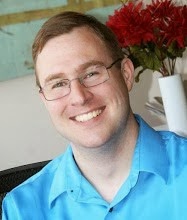I wish my classmates knew I had autism
by Beth
And now for part two of Monday’s post about medical privacy written by guest blogger Aaron Likens. Aaron is the Autism Ambassador for Easter Seals Midwest and raises awareness of Autism Spectrum Disorders by giving presentations to police, students, parents and teachers. This post seemed especially appropriate for April, which is Autism Awareness Month.
The power of awareness
by Aaron Likens
 One thing I love about my job is the countless opportunities I’ve had to speak to entire student bodies about the autism spectrum. Oh, I wish you could hear the amazing questions I’ve come across from all grade levels. When someone stands up and proclaims, “Hi, I don’t really have a question but I have a comment and I just want to let everyone know that I have Asperger’s, too,” well, it sends chills each time I hear that. That student in that moment felt empowered to speak up about this mysterious thing, and now something that was seemingly unknown to others beforehand — all the quirks, the oddities, and all that goes with being on the spectrum — might now make sense to others. That’s the power of awareness.
One thing I love about my job is the countless opportunities I’ve had to speak to entire student bodies about the autism spectrum. Oh, I wish you could hear the amazing questions I’ve come across from all grade levels. When someone stands up and proclaims, “Hi, I don’t really have a question but I have a comment and I just want to let everyone know that I have Asperger’s, too,” well, it sends chills each time I hear that. That student in that moment felt empowered to speak up about this mysterious thing, and now something that was seemingly unknown to others beforehand — all the quirks, the oddities, and all that goes with being on the spectrum — might now make sense to others. That’s the power of awareness.
My motto throughout my speaking career has been “understanding is the foundation for hope.” Without the understanding, well, a classroom can become resentful and maybe even spiteful at the different way students on the spectrum act, and the different ways they might be treated by teachers and staff. I don’t feel right telling people on the autism spectrum whether to disclose that information to others. I know some individuals with Asperger’s that will never, no matter the situation, open up and tell a soul about their diagnosis and they are entitled to that. At the same time another individual may want that knowledge to be out there because maybe they won’t be called “weird” or “odd” because there may be a better understanding of who they are.
I know I wish my classmates had known about my diagnosis (I didn’t know myself until I got diagnosed at the age of 20) because maybe I wouldn’t have been such an outcast like I was. I feel we are progressing towards better understanding of neural diversity and all the possible conditions, syndromes, and any other words that could fit that. The ultimate destination is acceptance, but without awareness there can be no understanding, and without understanding I’m afraid the cycle of confusion and frustration will just continue.
Learn more about autism spectrum disorder on easterseals.com.







April 17th, 2015 at 10:01 pm
Thanks for the kind words! I don’t know if I can ever put into words the honor it is to be invited to schools to present and the truly magical response. And to think that I protested the first time I had the chance. Oh, I was scared because what could I say to a fifth grader that would make sense? Scared? Very much so, but my protests were futile and I was told I was doing it (and rightfully so) and it was a rocky start as I turned to the teacher and whispered, “help” and she responded that I should start by explaining what, exactly, autism and Asperger’s is. Great idea, but I didn’t know what to say. Then, a student in the middle of the classroom rose his hand and said, “excuse me, but if I’m not mistaken isn’t autism and Asperger’s just a different way of perceiving the world around you?” There was this hush, and I was taken aback, and I responded, “hey, you want my job?” and from there it’s just grown and grown. It started with classrooms and now I’ll speak to entire student bodies and the questions, oh my I wish you could see it! I believe that if we want to truly change the world we have to reach the future and what better way is there than to speak to tomorrow’s future. You’d be shocked by their frame of reference, though. Someone usually will ask the questions in the Q&A section of, “how many people have autism?” and before I answer I ask, “how many people here knows someone or knows someone that knows someone with autism?” and it never fails that at least 75% of the student body will raise their hands and in that moment awareness and understanding is thrust into overdrive as they realize that autism isn’t something that is isolated to a cousin, a sibling, an uncle; it’s something much more prevalent and after that the level of compassion, empathy, and truly wanting answers is evident in the way the questions are asked and I always leave these presentations with a smile on my face and true hope for the future.
April 17th, 2015 at 3:00 pm
Love your post Aaron and so glad you are out there talking to kids.
April 16th, 2015 at 7:04 pm
Good after noon what an inspiring topic my nephew has the same challenges you have but I m clueless as where to help him.